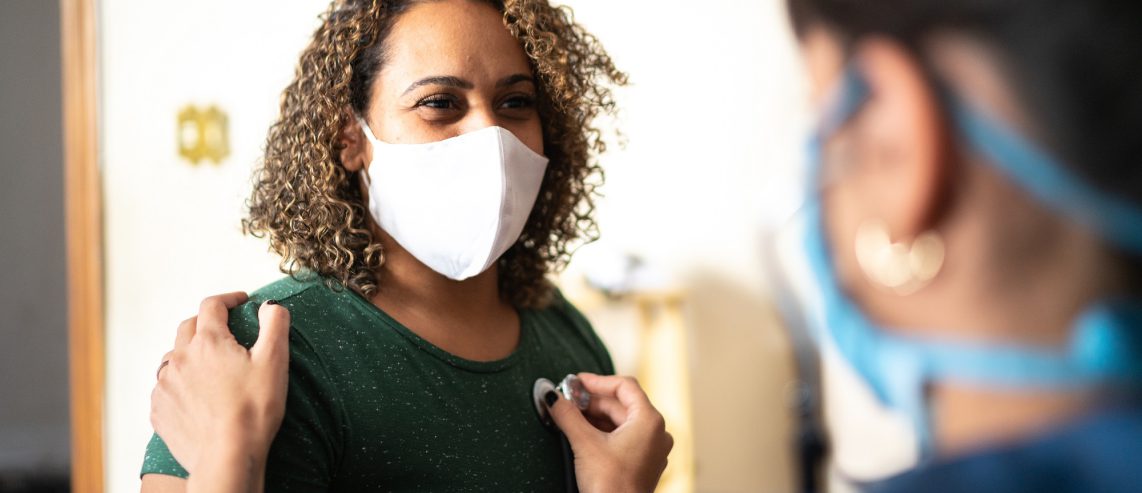If you’re an adult, you may wonder if you really need to see your primary care physician (PCP) for an annual physical. The answer is a bit complicated: Although that visit each year isn’t required, it can still benefit you.
Annual check-ins with your doctor can help you stay on top of your overall health. It can be important for preventive care and to help you manage ongoing conditions.
“The annual physical can change based on each individual,” says Nicholas Gorski, DO, family physician, UPMC Primary Care in Lewisburg. “But you can kind of think of it as preventive medicine, and preventive medicine is important.”
New Here - Living and Wellness
What Happens at an Annual Physical?
At an annual physical, your provider will take certain measurements, including:
- Height and weight.
- Blood pressure.
- Body mass index.
They also will perform examinations like:
- A head-to-toe examination.
- Listening to your heart.
- Listening to your lungs.
- Looking into your ears, eyes, and mouth.
You also may receive certain vaccinations based on your medical history.
Other tests and measurements may depend on factors like your age, sex, and any medical conditions you have.
Your doctor also will take a medical history, asking you questions about your lifestyle habits and your overall health. If you have a chronic condition or are on medication, they can ask how you’re feeling, take tests, and possibly update your medications. This discussion time is also an important time for you to ask your provider any questions that you have about your health.
Based on the results of your examinations and your discussion, your provider could order additional tests. These could include tests for cholesterol or diabetes, or imaging scans. Finally, your provider can remind you about screenings you may need depending on your age — such as colonoscopies, mammograms, or Pap smears.
“It’s much better if we find something before it’s problematic, or if we keep an eye on something or kind of see how things change over time,” Dr. Gorski says. “A lot of people like to talk about some of their chronic problems during an annual physical, too. So I think a lot of people appreciate that opportunity to just check in and kind of stay updated.”
Dr. Gorski says providers follow guidelines from the United States Preventative Services Task Force (USPSTF) in providing preventive care. Those guidelines, which are evidence-based, include everything from vaccinations to screening for depression and anxiety.
Never Miss a Beat!
Subscribe to Our HealthBeat Newsletter!
Thank you for subscribing!
You can now select the specific newsletters you'd like to receive.
You are already subscribed.
Subscribe to more newsletters in our email preference center.
Sorry, an error occurred. Please try again later.
Get Healthy Tips Sent to Your Phone!
Why An Annual Physical Is Important
Once you’re an adult, annual physicals allow you to have a yearly marker of how you’re doing. The tests and measurements taken can provide a snapshot of your overall health and wellness. Your provider can learn if you’re at risk for certain health conditions — or, if you already have a diagnosis, see how your condition is progressing.
“You can think of the physical as doing different levels of prevention,” Dr. Gorski says. “There’s the primary prevention, which is basically intervening before health effects occur. There’s secondary prevention, which is screening to identify diseases in their earliest stages. And then there’s tertiary prevention, which is basically managing those diseases after the diagnosis to slow or stop them.”
Can I Have My Annual Physical Online?
Many providers do offer virtual visits. These virtual visits are a good way for you to discuss your health concerns with your doctor. But some aspects of an annual physical — like listening to your heart and lungs — make an in-person visit better, Dr. Gorski says.
“I personally would appreciate an annual checkup in person for measuring the blood pressure and the weight,” he says. “I generally like to do an actual physical, and certain physical exam elements — whether it’s checking your thyroid, listening to your heart and lungs — we have been taught and trained to do different parts of the physical exam. And all that stuff is kind of difficult to do via telemedicine.”
Do I Need a Primary Care Physician?
You don’t need a dedicated PCP to get an annual physical. But Dr. Gorski recommends finding a PCP you’re comfortable with and maintaining a relationship with them.
According to the Journal of the American Medical Association, people with PCPs are more likely to fill prescriptions and get regular preventive care.
One benefit of having a regular PCP is having someone who is familiar with your medical history, Dr. Gorski says.
“We all have a varied medical history,” he says. “Trying to teach that history to every new person we come across, it becomes a rather arduous and difficult process and increases the risk of poor care. So in order to have the best care possible, you want to have a good relationship with your physician. And the physician wants to have a good relationship with the patient and know their patient well.”
A PCP you have a relationship with is also more likely to pick up on changes in your health and demeanor, Dr. Gorski adds. This can be especially beneficial to catch any problems during an annual physical.
UPMC Primary Care strives to provide comprehensive, compassionate care that you can trust. To find a provider near you, visit our website.
Editor's Note: This article was originally published on , and was last reviewed on .
Sources
David M. Levine, MD, MPH, MA, Bruce E. Landon, MD, MBA, MSc, Jeffrey A. Linder, MD, MPH, Journal of the American Medical Association, Quality and Experience of Outpatient Care in the United States for Adults With or Without Primary Care. Link
About UPMC
Headquartered in Pittsburgh, UPMC is a world-renowned health care provider and insurer. We operate 40 hospitals and 800 doctors’ offices and outpatient centers, with locations throughout Pennsylvania, Maryland, New York, West Virginia, and internationally. We employ 4,900 physicians, and we are leaders in clinical care, groundbreaking research, and treatment breakthroughs. U.S. News & World Report consistently ranks UPMC Presbyterian Shadyside as one of the nation’s best hospitals in many specialties and ranks UPMC Children’s Hospital of Pittsburgh on its Honor Roll of America’s Best Children’s Hospitals. We are dedicated to providing Life Changing Medicine to our communities.













